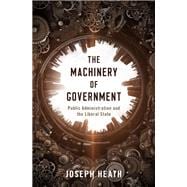
The Machinery of Government Public Administration and the Liberal State
by Heath, JosephBuy New
Rent Textbook
Rent Digital
Used Textbook
We're Sorry
Sold Out
How Marketplace Works:
- This item is offered by an independent seller and not shipped from our warehouse
- Item details like edition and cover design may differ from our description; see seller's comments before ordering.
- Sellers much confirm and ship within two business days; otherwise, the order will be cancelled and refunded.
- Marketplace purchases cannot be returned to eCampus.com. Contact the seller directly for inquiries; if no response within two days, contact customer service.
- Additional shipping costs apply to Marketplace purchases. Review shipping costs at checkout.
Summary
In most liberal democracies for example, the central bank is as independent as the supreme court, yet deals with a wide range of economic, social, and political issues. How do these public servants make these policy decisions? What normative principles inform their judgments? In The Machinery of Government, Joseph Heath attempts to answer these questions. He looks to the actual practice of public administration to see how normative questions are addressed. More broadly, he attempts to provide the outlines of a "philosophy of the executive" by taking seriously the claim to political authority of the most neglected of the three branches of the state. Heath both provides a corrective to the prevailing tendency to underestimate the contribution of civil servants to the success of liberal-democratic welfare states, and suggests a more satisfactory account of the principles implicit in public administration.
Author Biography
Joseph Heath is Professor in the Department of Philosophy and the Munk School of Global Affairs and Public Policy at the University of Toronto. A fellow of the Royal Society of Canada and the Trudeau Foundation, Heath is the author of several books, both popular and academic. His most recent, Morality, Competition and the Firm (Oxford University Press 2014), is a collection of papers on business ethics and the normative foundations of market economies. He is also the author of Enlightenment 2.0, which won the Shaughnessy Cohen prize for Political Writing in Canada.
Table of Contents
1. Taking Public Administration Seriously
1.1 Inside the machine
1.2 Beyond discretion
1.3 Administrative power
1.4 The permanent civil service
1.5 Political neutrality
1.6 Liberalism or democracy?
1.7 Conclusion
2. A General Framework for the Ethics of Public Administration
2.1 Preliminary clarifications
2.2 Three models of accountability
2.3 The hierarchical model
2.4 The popular model
2.5 The vocational model
2.6 Conclusion
3. Liberalism: From Classical to Modern
3.1 Before liberalism
3.2 The rise of classical liberalism
3.3 The triumph of classical liberalism
3.4 The decline of classical liberalism
3.5 The rise of modern liberalism
3.6 Conclusion
4. Efficiency and the Rise of the Welfare State
4.1 The egalitarian model
4.2 The communitarian model
4.3 The public-economic model
4.4 Assessing the models
4.5 Wagner's law
4.6 The rent-seeking view
4.7 Conclusion
5. Cost-Benefit Analysis as an Expression of Liberal Neutrality
5.1 "Embedded" CBA
5.2 Provision of a public good
5.3 Imposing a regulation
5.4 Assessing safety
5.5 Rationing health care
5.6 Environmental goods
5.7 The three-step procedure
5.8 Conclusion
6. Administrative Discretion and the Rule of Law
6.1 Discretion
6.2 Varieties of discretion
6.3 Discretionary enforcement
6.4 The morality of law
6.5 Administrative law
6.6 Conclusion
7. Paternalism and Individual Freedom
7.1 Mill's argument
7.2 Bureaucratic paternalism
7.3 The Harm Principle
7.4 Hyperbolic discounting
7.5 Cognitive bias
7.6 The nudge framework
7.7 Conclusion
An electronic version of this book is available through VitalSource.
This book is viewable on PC, Mac, iPhone, iPad, iPod Touch, and most smartphones.
By purchasing, you will be able to view this book online, as well as download it, for the chosen number of days.
Digital License
You are licensing a digital product for a set duration. Durations are set forth in the product description, with "Lifetime" typically meaning five (5) years of online access and permanent download to a supported device. All licenses are non-transferable.
More details can be found here.
A downloadable version of this book is available through the eCampus Reader or compatible Adobe readers.
Applications are available on iOS, Android, PC, Mac, and Windows Mobile platforms.
Please view the compatibility matrix prior to purchase.
